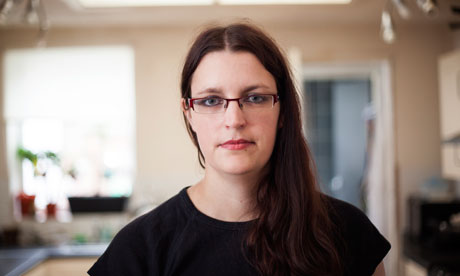
"I've never heard of any of these people who've got firsts."
"That's because they're all saddos who never leave the library."
They're also sitting directly in front of you, I thought, exchanging a wry grin with one of my fellow firsters.
"I mean, Lynda Clark, who the hell is that?"
"Oh, you know her – she's the one with the really weird voice."
"The one who sounds like she's crying all the time?"
"Yeah."
Oh.
That little exchange, while partly a gratuitous plug for my own academic achievement, was also the first time I ever really thought about my voice. And once I did start to think about it, I realised people have always defined me by it.
When I was very little, my enunciation was often commented upon. Five-year-old council estate children generally aren't expected to say things like: "Thank you very much for having me Mrs Collins. The cake was especially delicious." But when you're an impressionable sort raised on Enid Blyton, that's how you end up speaking.
Throughout school, I was known as "the one with the squeaky voice". I was far too busy being bothered about being flat-chested to give much thought to it, so it was never really a problem – until it became a problem.
It was at university that things started to get weird. Particular sounds went missing every time I tried to say them. My favourite animal, the noble horse, became a h … orse. Weirder still, on nights out drinking, my voice went back to its squeaky but fluent self.
I went to the doctor. "Gargle with salt water," he told me confidently, "It'll be gone in three weeks." After six weeks of gargling, I gave up and didn't bother returning in case he gave me leeches or offered to do a blood-letting.
It was after university that my vocal problems started to make me really miserable. I worked in a bookshop, and there is nothing crueller than the general public. Phone customers would became angry that someone so vocally defective should be permitted to operate a telephone. Suddenly, numbers were impossible. It was like my brain and throat were locked in a desperate wrestling match, and every so often, one or the other would tap out, leaving me open-mouthed and gasping.
Fortunately, I left the horrors of retail and joined the games industry. My colleagues were very understanding and patient, and it was here I made another odd discovery. When I laughed (which happened a lot more making games than it did selling books) my voice was normal immediately afterwards. If I put on an accent it was also normal. So I returned to the doctor. It was the same doctor as before, but as luck would have it, he had a young student with him. She listened to me, nodding solemnly. She didn't look in my throat at all, instead looking in my eyes, asking me to say a few key things and then testing my reflexes.
The doctor obviously disapproved, muttering under his breath, "This is mechanical, not neurological." Thankfully, she ignored him, and told me, "I think this might actually be your brain." The GP looked furious. Now he had to send me to the hospital or look negligent, even though he knew it was just a sore throat. He compromised by sending me to a speech therapist. Within five minutes, the therapist said kindly: "I think you may have a brain disorder called spasmodic dysphonia. It's nothing to worry about, but I just want to get some specialists to look at you."
It must have seemed odd when I laughed with delight at this news. I listened to concerned explanations that there was no cure and that it could get worse, but all I could really think was: it's actually a thing! I have an actual thing – I'm not just rubbish at talking!
My form of the condition is called abductor spasmodic dysphonia. This means that my brain sends the wrong signals to my throat when asking it to speak, causing my vocal chords to randomly open, making speech difficult. There is even a treatment: Botox injections into the vocal cords, every three months, for ever. I duly went for my first injection. The specialist explained: "So I'll just take a hold of your voice box, and twist it to the side so I can get the needle in the right place."
He seemed to think that even though he was making a twisting and stabbing motions, adding "just" to the sentence made it comforting. It did not. But, in the end it wasn't so bad. I've had worse.
Which brings me back to the way spasmodic dysphonia (or spasmo, as no one except me calls it) is perceived. The bookshop times were pretty low, but now I know it really couldn't be helped, I don't much care. It's more a reflection on those unpleasant customers than on me.
For me, in general, spasmo is an inconvenience, but for many others it is a disease that must be managed and suffered. I believe the main reason it doesn't affect me in this way is that I've always had a weird voice, with its clipped 1950s phrasing, or pre‑pubescent Joe Pasquale squeakiness. It's not something I've loved or hated, it was just always, in a very British way, a bit rubbish. For those who once had a rich booming baritone, or a sultry silky drawl, the loss of that piece of themselves must be very distressing. But for me, spasmodic dysphonia is just a bit of a git.

